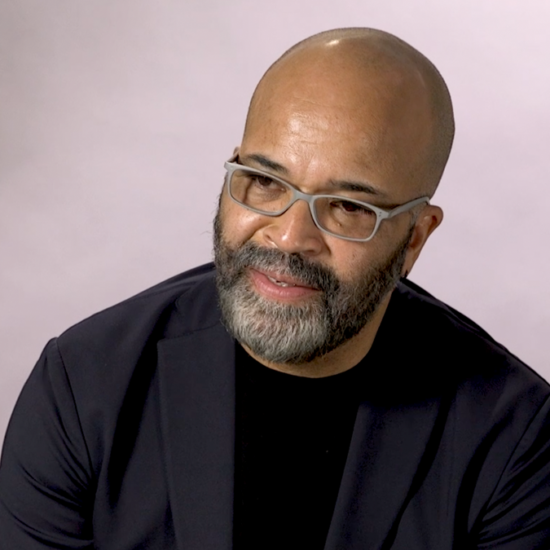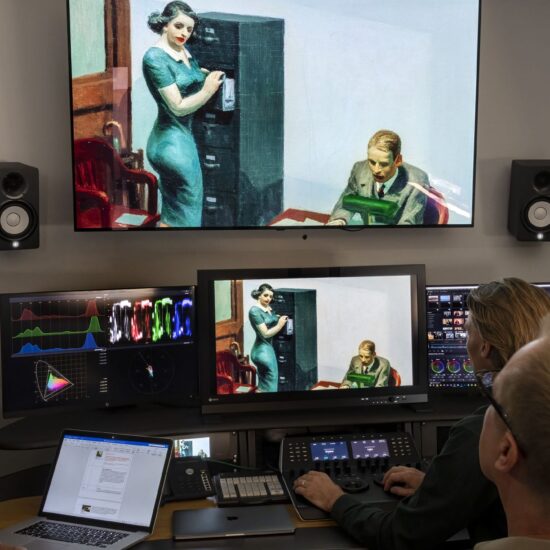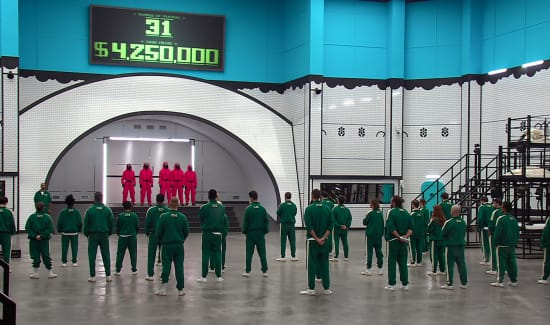
The views and opinions expressed in this article are those of the writer and do not reflect the views of American Masters.
Sometimes, what appears to be only an eerie echo from a dark and safely distant past can turn out to be a solemn harbinger of troubling things on the horizon.
You can remain blithely unaware of this until events suddenly overtake you.
Twenty years ago, walking the Unter den Linden Boulevard in the Mitte district of Berlin, I passed the expansive Bebelplatz cobblestone plaza of the historic Humboldt University library, noticing a milky glow emanating from the ground near the plaza’s center. As I approached, the light became brighter, harsher, a ghostly aura rising into the night sky. Arriving at the light’s source, I saw it was a large square of thick tempered glass set into the plaza that allows a visitor to gaze down deeply into a brightly illuminated subterranean room lined with empty bookshelves, painted stark ivory white.
The public memorial called “The Empty Library” was created in 1995 by Israeli sculptor Micha Ullman to commemorate a massive Nazi book burning that took place on that plaza on May 10th, 1933, when more than 20,000 books were burned, targeting works by Jewish, communist, and other liberal writers and scholars. Hordes of onlookers reveled as Nazi military musicians and singers accompanied the spectacle. Seventy years later, the glowing empty shelves offered a silent, somber testimony to all that was lost in letters, learning and lives. Surely, we could never go that way again.
In fact, though there were no bonfires, it would only be seven years after my visit to Bebelplatz in 2010, that Arizona HB 2281 would be passed and signed into law by then-Governor Jan Brewer. That legislation specifically intended to restrict public schools from offering ethnic (largely Mexican American) studies courses that, in the law’s text, “ . . . promote resentment toward a race or class of people.” Critics of the law at the time attributed it to smoldering resentment against United Farm Workers’ co-founder and civil rights firebrand Dolores Huerta for a 2007 speech she delivered in Tucson, when she had opined that Republicans hate Hispanics.
HB 2281 included a list of books to be banned from schools by Chicanx authors, many of them friends and allies of mine, including Sandra Cisneros, Jimmy Santiago Baca, Carmen Tafolla, Luis Alberto Urrea, Ana Castillo and Luis Valdez, among a host of other influential Mexican American scribes and scholars.
Though the legislation would be ruled unconstitutional in a U.S. District court in August of 2017, advocates say that suppression of Chicano studies in Arizona public schools remains in place. What fears drove these bans in the first place? What dreaded expectations fueled the authoritarian imagination required to conceive such measures? Anatomizing such pathologies is for another, less urgent time.

Dolores Huerta holds up a Huelga (strike) sign in protest, courtesy of Paul Richards estuarypress.com
Because far from retreating after the 2017 ruling, the zombie-like book-banning specter would later resurge and metastasize, spreading eventually with a vengeance to Florida and Texas—even to my San Antonio home to which I returned in 2005 after a decades-long sojourn in New York City. Indeed, the North East Independent School District (NEISD), where I attended public schools from elementary to high school graduation, emerged as the most prolific inquisitor and banner of books in Texas.
In 2022, NEISD pulled 431 books from school library shelves to be reviewed “for appropriateness,” eventually removing 119 of those, though the district’s official communications used the term “replaced,” rather than “banned.” School districts in Pasadena (near Houston) and Bryan (near College Station) also posted competitive numbers of removals.
These moves followed a 2021 extra-legislative gambit by Texas Freedom Caucus State Representative Matt Krause of Fort Worth, Chair of the House Committee on General Investigating, when he disseminated a public letter demanding a review of books on themes ranging from racial and social justice to gender identity and LGBTQIA+ narratives. The letter included a 16-page spreadsheet of 850 titles, including “The Fight for LGBTQ+ Rights,” “What is the Black Lives Matter Movement?,” and “The Confessions of Nat Turner.” According to the San Antonio Current, Representative Krause “gave no explanation for how he compiled the list, nor did he list specific districts from which he demanded his accounting.”
After the announcement of the inquisition into selected books in the North East District in San Antonio, I wrote in protest and concern to the Superintendent, Dr. Sean Maika. And it wasn’t just that I was insulted as an alumnus of the district’s schools—where I had freely read such dangerous, once-banned books as Allen Ginsberg’s “Howl” and William Burroughs’s “Naked Lunch” during my school years and later went on to become the first Latino Rhodes Scholar to study at Oxford. My daughter was now at the middle school I once attended, and the thought that her borderless intellectual freedom would be in any way infringed upon by puritanical book-banning fevers added injury to insult.
I’ll spare you the details, but the response to my protest was predictably thin and duplicitous, to be generous, and the inquisition proceeded to its ignominious conclusion. Perhaps, needless to add, I’ve never been invited to speak at any of the district schools I attended, Chicano Rhodes Scholar or not.
According to a recent 2023 PEN America report, “Banned in the USA: State Laws Supercharge Book Suppression in Schools,” the last school year nationwide saw “1,477 instances of individual books banned, affecting 874 unique titles . . . Overwhelmingly, book banners continue to target stories by and about people of color and LGBTQ+ individuals.” The report lists Texas, Florida, Missouri, Utah and South Carolina as the states with the most prevalent bannings, “driven by a confluence of local actors and state-level policy.” Shamefully, Texas tops the list, and my own Northeast District in San Antonio wears the state crown for banning—a dubious honor to be sure.
So, where is this story now, and where is it going?
“If you asked me 10 or 20 years ago, I would probably have said that the main problems facing freedom of expression emanate from religious extremism,” Salman Rushdie said at the late September 2023 First Amendment Summit in Philadelphia. “I think now we’re facing another old enemy, which is authoritarianism … [There is] a willingness amongst at least some part of the population to cease to value the democratic values enshrined in the first amendment.”
How are we to respond to these new challenges?
“Reading these books is a form of resistance,” said Iris Mogul, a junior at a Miami high school, in The Guardian about her thwarted efforts to study African American advanced placement history in a state where that aspiration has been officially curtailed for now. And there is resistance in reading among youth, amidst new scholarship, among activists and artists and creatives. Even as these onslaughts against our most precious freedoms continue to morph and seek clever new ways to hedge or fully censor curiosity—excluded voices, ignored and disparaged communities are coming into the American public square as never before.  Even as DEI programs, along with the teaching of Critical Race Theory, have been legislatively proscribed in Texas schools and universities, ethnic studies programs, Chicano, African American and Indigenous studies have been authorized by the Texas Education Agency and are popular in high schools across the state. Historians are revealing new details about the legacy of anti-Mexican violence, including the early 20th century widespread dispossession of lands and lynchings that shaped the Lone Star state.
Even as DEI programs, along with the teaching of Critical Race Theory, have been legislatively proscribed in Texas schools and universities, ethnic studies programs, Chicano, African American and Indigenous studies have been authorized by the Texas Education Agency and are popular in high schools across the state. Historians are revealing new details about the legacy of anti-Mexican violence, including the early 20th century widespread dispossession of lands and lynchings that shaped the Lone Star state.
New films, like A Song for Cesar, are bringing to light the little-known role that musicians and artists played in supporting and promulgating la causa of the United Farm Workers’ Movement, rooted in Cesar Chavez’s understanding of the power of artistic and musical creativity in building new expressions of social conscience in pursuit of justice. All of these are new forms of resistance, counters to the viral forces of censorship and authoritarianism.
Houston-based writer and activist Tony Diaz—“el Librotraficante,” or book-smuggler—has been working against book-banning dating back to Arizona HB 2281 in 2010, when he first “trafficked” copies of the banned Chicano books into that state. In a recent conversation, Diaz spoke of ongoing organizing efforts to contest those who seek to ban books, in Texas and nationwide.
“Only art can save us,” he said. “If you want to start a cultural revolution, you’ve got to convene the poets, to continue to feed the imagination, the culture, to keep people excited and engaged—easier said than done, but some very beautiful things are happening in the art landscape.”
In response to the challenges to unfettered freedom of letters, he pointed to the creation of a Latino literary bookstore in San Antonio, of organizing large community-based literary events in Houston. And to supporting and promulgating libraries: “…Underground libraries, it’s always come to that—public libraries, and family libraries.”
The stakes are high, even mortal.
A plaque placed nearby “The Empty Library” public memorial in Berlin’s Bebelplatz contains an eerily prescient quote from 19th century German-Jewish writer Heinrich Heine:
That was but a prelude:
where they burn books,
they will ultimately burn people as well.


















